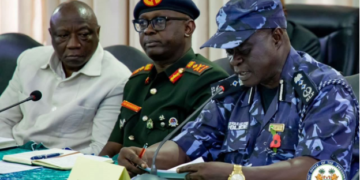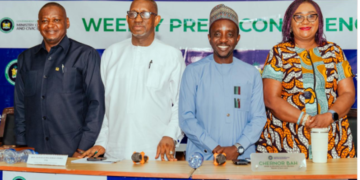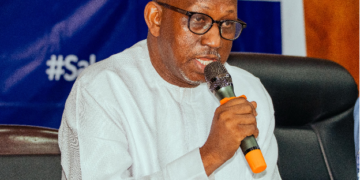By Alieu Amara Suwu
Tertiary Education Commission (TEC) in partnership with the Commonwealth of Learning Canada has held a two-in-one workshop for the Enactment and finalisation of Open Distance Learning (ODL) for Sierra Leone and for the development and validation of guidelines for ODL materials, courses and programmes for participants from Tertiary Education Institutions (TEIs) and key stakeholders involved in ODL.
The workshop which commenced on the 31st of October and ended on the 4 of November 2022, was held at the Milton Margai Technical University, Congo Cross campus, Freetown.
Professor Emeritus Olugbemiro Jegede, Foundation Vice-Chancellor of the National Open University of Nigeria (NOUN) and Consultant to the project, said the goal of the Workshop is to produce a national ODL policy to regulate ODL programmes in the TEIs in Sierra Leone based on the statutory mandate of the TEC. He explained the mode of delivery, disadvantages and individual advantages, and clearly noted the common understanding that the use of ODL automatically implies that Information and Communication Technology (ICT) or the internet is the only mode of delivery. Thus, he talked about the roles and needs of facilitators and guidance councillors to support the ODL with some periodic face-to-face contact with learners. He advised if the ODL is to be effective, each institution that plans to implement this mode of delivery must develop and own its own ODL policy which should be compliant with the national policy.
Professor A M. Alghali, Chairperson of TEC, said over the last five days they have been having two workshops, first, to develop ODL regulatory policy for tertiary education institutions, and second, to train people on programmes and materials development for ODL. Talking about the necessity for policy development, he said currently institutions are offering ODL courses and programmes and they are just doing what they want, therefore they (TEC) want to bring sanity into the system. He said every institution is involved so together they all formulate the policy which will then regulate the way the institutions perform. In terms of capacity, he stated clearly that the Government has nothing to do with that as of now because some institutions have started operating ODL programmes, thus they need to regulate those programmes. Generally speaking, he said the purpose of the action taken is to bring credibility and confidence in programmes that are developed by ODL and to improve on the delivery so that there will be confidence, integrity and respect for programmes delivered through ODL.
Josephus Sawyer, Acting Executive Secretary of TEC, said having a policy will also provide guidelines on how policies should be developed in terms of courses, programmes and materials. He said wench it is validated and adopted will be tabled to the respective courts of the universities, after being tabled at the general commission for approval and then copied to the Ministry of Technical and Higher Education (MTHE) for adoption. Going forward, he said it will be the policy for all accredited tertiary education institutions. He described the workshop as an embracing one therein every stakeholder in tertiary education is represented, noting that it is not a talk shop but a workshop wherein every participant contributed who he said are from all facets of higher education, private and public universities and polytechnics. He said the policy will be embraced, a policy that will stand the test of time for institutions and a policy that will be used as a face line to clamp down on the proliferation of illegal institutions. He said it expected of all institutions, after the adoption of the policy, to be fully oriented about what it is all about.
Sheikh Ali Y. Kallay, Country Representative for International Open University and a participant told Observer that the workshop is comprehensive and consultative, and he thought it is appropriate and timely to have a policy on ODL. Speaking on the benefit, Sheikh Kallay said it will bring sanity, trust and credibility not only for the institutions but for also the country’s educational status. He further that Sierra Leone’s educated rate is small compared to other countries like Zimbabwe. So he thought that will broaden the space for more learners and the educated rate of the country.

























